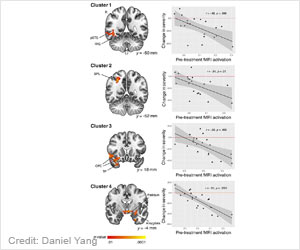Study reveals how specific brain regions are activated during memory recall in two-year-olds.

‘fMRI tests showed that children who showed good episodic memory also showed stronger hippocampal activation.’





The team is led by Professor Simona Ghetti, Department of Psychology and Center for Mind and Brain. Ghetti's laboratory is interested in how memory and cognition develop in children. The hippocampus, a small structure deep in the middle of the brain, is important for forming and recalling memories and is thought to be involved in developing memory abilities in infants.
Functional Magnetic Resonance Imaging (MRI) is a powerful technique for measuring activity in the brain. But it's difficult to conduct conventional fMRI studies with very young children, because it requires completing a task while lying still with your head inside a large, noisy scanning machine.
Ghetti and postdoctoral researcher Janani Prabhakar worked out an alternative protocol that allows them to take measurements from a child during natural, nighttime sleep in the MRI scanner.
Asleep inside a scanner
Advertisement
At their usual bedtime, they went to sleep inside the MRI scanner. While the child slept, the researchers played recordings of songs that they had heard earlier or unfamiliar songs.
Advertisement
Prabhakar and Ghetti found a stronger signal from the hippocampus when a familiar song was played. Children who showed good episodic memory also showed stronger hippocampal activation in the fMRI test, they found.
Source-Eurekalert














